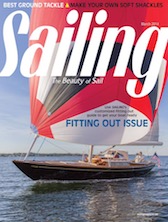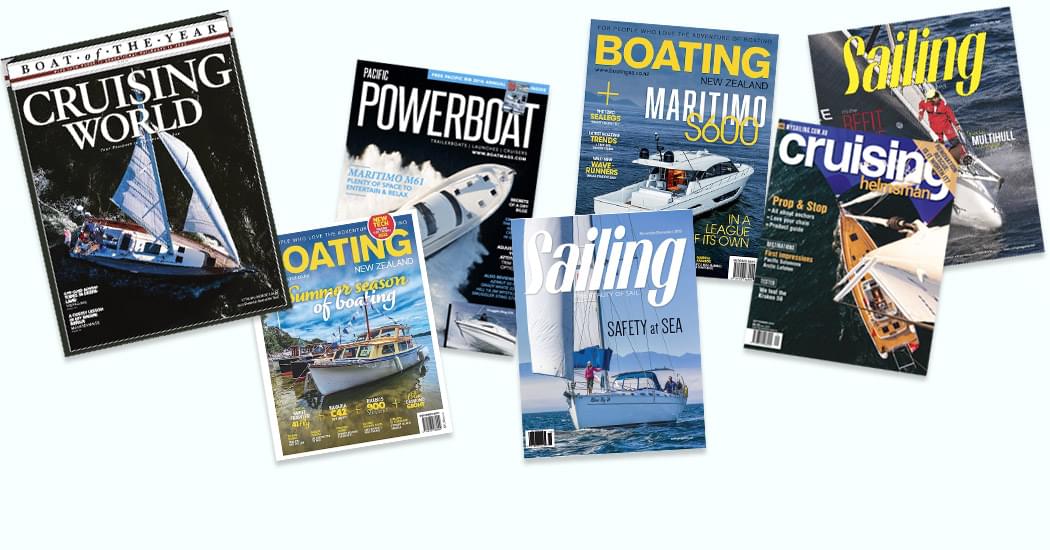
Sailing
05 14 Topic : Yacht Reviews | Sailing Magazine

Dibley 45
A Design Review by Robert Perry, Technical Editor of SAILING, and renowned yacht designer.
I don’t think I have ever met Kevin Dibley. I feel like I have, though. I’ve been looking at his design work for a few years, and it seems we are friends.
 My reviews have given me the opportunity to become friends with designers all over the world. I’ve also probably made an enemy or two along the way. Kevin does a wide variety of work out of his Auckland, New Zealand, office and he’s another one of those design- ers with a good eye for aesthetics and performance. His new design is this 45-foot racer built in China and offered in two models: a budget model and a full-race model, or as Kevin calls them, the “simplified” version and the “performance” version.
My reviews have given me the opportunity to become friends with designers all over the world. I’ve also probably made an enemy or two along the way. Kevin does a wide variety of work out of his Auckland, New Zealand, office and he’s another one of those design- ers with a good eye for aesthetics and performance. His new design is this 45-foot racer built in China and offered in two models: a budget model and a full-race model, or as Kevin calls them, the “simplified” version and the “performance” version.
To my eye this very wedgelike hull plan- form has max beam right at the corner of the uncambered transom. The hull lines show a hint of hollow at the entry but very little. Surprise, there is no chine! If you use a chine you have to be very careful that you aren’t dragging the leeward chine at low heel angles. That is slow. This unchined shape is a good shape for upwind and light air. As flat and straight as the run is, I don’t see any problem with this hull being very fast off the wind despite no chine. I wonder if we will ever see a day when designers gather and say, “Remember back when we were all using chines? What a hoot.” That could happen. Remember the “trapezoidal keel” or the “elliptical planform keel”?
The D/L of this design is 95.5 and the L/B is 3.08, so it’s a pretty light, beamy boat. Draft is 10 feet 1 inch. That will make you pay attention in some areas. In the Puget Sound it would be no problem. The deep T- keel has a long, low-drag bulb. There is no mention of a kelp cutter in the specs, but you would need one on Puget Sound or a compliant teenager with a wet suit. I stuck my straight edge on the sheer and it’s dead straight. Dead-straight sheers never look dead straight. The 2-D image you see on a drawing does not exist in the real 3-D world. I like this hull. It is very sexy.
There is an interior layout, but it’s very simple. There are settees amidships and stacked quarter berths aft to keep crew weight centered over the LCB. There is a centerline galley just aft of the mast but don’t expect a leg of lamb for dinner. You might get a cold lamb sandwich, and that’s not bad. The head is also on centerline forward of the mast. It is adequate. The ends of the boat are all empty. The auxiliary engine is tucked in just aft of the companionway ladder and very accessible. You get some nice big lockers between the settees and the Q-berths. It’s not a cruisy boat, so you wouldn’t expect a cruisy interior.
Race boats are all about hulls, rigs and deck layouts. The simplified deck layout has three less winches than the performance deck layout. You get a pedestal winch with the performance version. The companionway hatch on the performance version is also quite short, but I’m not sure why.
The non-overlapping jibs are led to short, athwartships tracks adjacent to the mast. The mainsheet is lead aft under the deck on the performance version, and on top of the deck on the simplified version. Kevin says they are happy to customize the deck layout to
your requirements. The mainsheet traveler is ahead of the twin wheels and spans the widest part of the cockpit sole. The sprit retracts on the performance version, but it is fixed on the simplified deck. Even the simplified deck would make a good racing layout for all but grand prix events.
When I look at the rig numbers, the first thing I think of is, “1,287 square feet of sail area? That’s half again as much as a Valiant 40, and the Dibley weighs 10,000 pounds less!” To quote my very favorite movie, “Strange times, Archie, strange times.” The 45 is a hot rod. But the backstay is fixed and the main- sail head is not square. This boat will not rely on prudent running backstay management to keep the rig from turning inside out. Look at that I dimension of 61 feet 6 inches.That’s 11 feet 6 inches more than a Valiant 40! And, it’s a fractional rig.The SA/D is 33.19.The mast and boom are carbon and the rigging is rod.
Built in China, this will be a fun boat to watch.
I don’t think I have ever met Kevin Dibley. I feel like I have, though. I’ve been looking at his design work for a few years, and it seems we are friends.

To my eye this very wedgelike hull plan- form has max beam right at the corner of the uncambered transom. The hull lines show a hint of hollow at the entry but very little. Surprise, there is no chine! If you use a chine you have to be very careful that you aren’t dragging the leeward chine at low heel angles. That is slow. This unchined shape is a good shape for upwind and light air. As flat and straight as the run is, I don’t see any problem with this hull being very fast off the wind despite no chine. I wonder if we will ever see a day when designers gather and say, “Remember back when we were all using chines? What a hoot.” That could happen. Remember the “trapezoidal keel” or the “elliptical planform keel”?
The D/L of this design is 95.5 and the L/B is 3.08, so it’s a pretty light, beamy boat. Draft is 10 feet 1 inch. That will make you pay attention in some areas. In the Puget Sound it would be no problem. The deep T- keel has a long, low-drag bulb. There is no mention of a kelp cutter in the specs, but you would need one on Puget Sound or a compliant teenager with a wet suit. I stuck my straight edge on the sheer and it’s dead straight. Dead-straight sheers never look dead straight. The 2-D image you see on a drawing does not exist in the real 3-D world. I like this hull. It is very sexy.
There is an interior layout, but it’s very simple. There are settees amidships and stacked quarter berths aft to keep crew weight centered over the LCB. There is a centerline galley just aft of the mast but don’t expect a leg of lamb for dinner. You might get a cold lamb sandwich, and that’s not bad. The head is also on centerline forward of the mast. It is adequate. The ends of the boat are all empty. The auxiliary engine is tucked in just aft of the companionway ladder and very accessible. You get some nice big lockers between the settees and the Q-berths. It’s not a cruisy boat, so you wouldn’t expect a cruisy interior.
Race boats are all about hulls, rigs and deck layouts. The simplified deck layout has three less winches than the performance deck layout. You get a pedestal winch with the performance version. The companionway hatch on the performance version is also quite short, but I’m not sure why.
The non-overlapping jibs are led to short, athwartships tracks adjacent to the mast. The mainsheet is lead aft under the deck on the performance version, and on top of the deck on the simplified version. Kevin says they are happy to customize the deck layout to
your requirements. The mainsheet traveler is ahead of the twin wheels and spans the widest part of the cockpit sole. The sprit retracts on the performance version, but it is fixed on the simplified deck. Even the simplified deck would make a good racing layout for all but grand prix events.
When I look at the rig numbers, the first thing I think of is, “1,287 square feet of sail area? That’s half again as much as a Valiant 40, and the Dibley weighs 10,000 pounds less!” To quote my very favorite movie, “Strange times, Archie, strange times.” The 45 is a hot rod. But the backstay is fixed and the main- sail head is not square. This boat will not rely on prudent running backstay management to keep the rig from turning inside out. Look at that I dimension of 61 feet 6 inches.That’s 11 feet 6 inches more than a Valiant 40! And, it’s a fractional rig.The SA/D is 33.19.The mast and boom are carbon and the rigging is rod.
Built in China, this will be a fun boat to watch.

